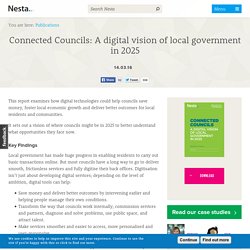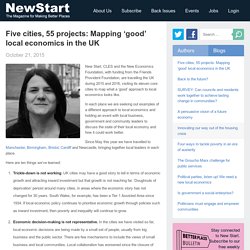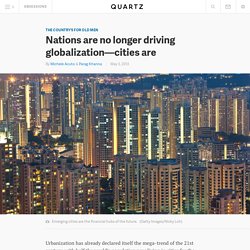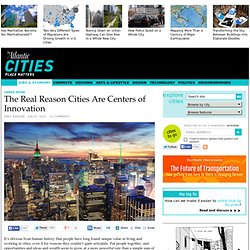

Connected Councils: A digital vision of local government in 2025. This report examines how digital technologies could help councils save money, foster local economic growth and deliver better outcomes for local residents and communities.

It sets out a vision of where councils might be in 2025 to better understand what opportunities they face now. Key Findings Local government has made huge progress in enabling residents to carry out basic transactions online. But most councils have a long way to go to deliver smooth, frictionless services and fully digitise their back offices. Digitisation isn’t just about developing digital services; depending on the level of ambition, digital tools can help: The 2025 vision Like the best tech companies, future councils will be lean, agile and data-driven.
Relational services (such as social care) still rely heavily on face-to-face contact. Policy Recommendations The report recommends: Councils become digital by default, moving all transactional services online and fully digitising their back offices by 2020. Authors. Papers in Canadian Economic Development. Papers in Canadian Economic Development includes selected policy analysis papers written by economic development professionals to complete the requirement for the Certified Economic Developer - Fellowship designation or to complete the Economic Development Program's Year 3 course, Leadership and Advanced Economic Development Insights.

Some volumes include outstanding papers from our Certificate courses. Articles may cover any aspect of the broad economic development field, but often explore marketing, economic analysis, entrepreneurship, public consultation, BR&E, tourism, creative industries, green economy, and First Nations. The opinions expressed in the papers are those of the individual authors, and do not necessarily represent those of their respective employers, the University of Waterloo, the Economic Developers Association of Canada, or the editors.
Authors are, of course, responsible for the accuracy of statements made. Articles on additional topics are available in the Archives. Five cities, 55 projects: Mapping ‘good’ local economics in the UK - NewStart. October 21, 2015 New Start, CLES and the New Economics Foundation, with funding from the Friends Provident Foundation, are travelling the UK during 2015 and 2016, visiting its eleven core cities to map what a ‘good’ approach to local economics looks like.

In each place we are seeking out examples of a different approach to local economics and holding an event with local business, government and community leaders to discuss the state of their local economy and how it could work better. Since May this year we have travelled to Manchester, Birmingham, Bristol, Cardiff and Newcastle, bringing together local leaders in each place. Here are ten things we’ve learned: Trickle-down is not working: UK cities may have a good story to tell in terms of economic growth and attracting inward investment but that growth is not reaching far. Nations are no longer driving globalization—cities are - Quartz. Urbanization has already declared itself the mega-trend of the 21st century, with half the world’s population now living in cities for the first time in human history.

While the implications for economic growth have been widely discussed, urbanization’s impact on diplomacy and sovereignty will be equally profound. Consider just two major issues on the global agenda: security and climate change. After the 9/11 terrorist attacks on New York City and the November 2008 terror attack on Mumbai, both cities moved to strengthen their own security services and intelligence capabilities beyond what Washington and Delhi could provide and mandate. The Mideast’s iconic Dubai has long done the same beyond the shadow of federal Emirati capital Abu Dhabi. Now look at climate change. As cities continue to arrogate major diplomatic and economic functions, should we still be talking about international relations? We welcome your comments at ideas@qz.com.
The Real Reason Cities Are Centers of Innovation - Emily Badger. It’s obvious from human history that people have long found unique value in living and working in cities, even if for reasons they couldn’t quite articulate.

Put people together, and opportunities and ideas and wealth seem to grow at a more powerful rate than a simple sum of all our numbers. This has been intuitively true for centuries of city-dwellers. "What people didn’t know," says MIT researcher Wei Pan, "is why. " There have been plenty of theories. Adam Smith famously figured that people become more productive when we’re able to specialize, each of us honing a separate area of expertise. "We think there’s an underlying completely different way of thinking here, which is very different from the economist’s way of thinking," says Pan, a doctoral candidate in computational social science in the MIT Media Laboratory's Human Dynamics Lab.
Via Desmos As for why this happens, though, Pan pushes aside theories about the location of manufacturing or the specialty of trade. Aiab100106. Kotkin What is a City For LKYCIC. Plan Melbourne.